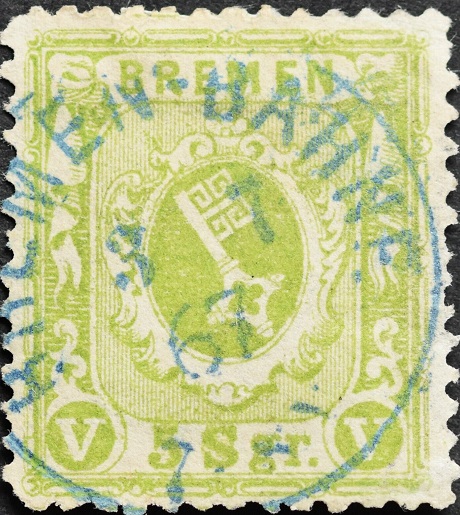 |
|||||
|
|||||
| Preview of Stamps Catalogue: VOLUME 1 |
 |
|||||
|
|||||
| Preview of Stamps Catalogue: VOLUME 1 |
Brême
Return To Catalogue - Bremen miscellaneous - Forgeries of the 3 G and 5 Grote stamps - Forgeries of the 2 G and 10 G stamps - Forgeries of the 7 G and 5 Sgr stamps - Forgeries made by Peter Winter
Note: on my website many of the
pictures can not be seen! They are of course present in the catalogue;
contact me if you want to purchase it.
Currency: 72 Grote (=30 Silbergroschen) = 1 Taler
One of the German States. A free city of the Hansa in Northern Germany. It issued stamps from 1855 to 1867, it used the stamps of the North German Confederation afterwards (from 1st January 1867 onwards). Foreign post offices, such as those from Thurn and Taxis (number cancel 301), Hanover or Prussia existed in Bremen, they used their own stamps.
Many forgeries of Bremen exist.
3 (Grote) black on blue 5 Grote black on lilac 7 Grote black on yellow 5 Sgr green
For the specialist: there are 3 types of the 3 Gr black on blue, they differ in the ornaments at the bottom of the stamp. Furthermore, two types of the 5 Gr black on lilac exist: type I has the lines between the left '5' and the shield going upwards, type II has them going downwards. The 5 Sgr green imperforate is printed in a slightly different type from the perforated/rouletted stamps: in the perforated/rouletted stamps, there are two fine lines in the pendant at the right hand side, which are missing in the imperforate stamps.
Value of the stamps |
|||
vc = very common c = common * = not so common ** = uncommon |
*** = very uncommon R = rare RR = very rare RRR = extremely rare |
||
| Value | Unused | Used | Remarks |
| Imperforate | |||
| 3 g | RR | RR | Issued 10th April 1855, intended for local letters
and letters to Bremerhaven and Vegesack. The three types were printed next to each other. |
| 5 g | R | RR | Issued 4th April 1856. For use on letters to Hamburg.
Non-issued stamps with inscription 'MARKEN' were sold as remainders in 1868. |
| 7 g | R | RRR | Issued 10th July 1860. For use on letters to Lubeck and Mecklenburg-Schwerin. |
| 5 sgr | R | RRR | Issued 13th December 1861. For letters to Great Britain. |
Rouletted (1862) |
|||
| 3 g | RR | RRR | |
| 5 g | RR | RR | |
| 5 sgr | RRR | RRR | |
| Perforated 13 (1867) | |||
| 3 g | R | RRR | |
| 5 g | R | RR | |
| 7 g | R | RRR | No more dividing lines between the stamps. |
| 5 sgr | RR | RR | |
All stamps of Bremen were manufactured by the firm Hunkel (Bremen).
Forgeries of the 3 G and 5 Grote stamps click here or forgeries of the 7 G and 5 Sgr stamps, click here. Some non-issued 5 g stamps with inscription 'Marken' instead of 'Marke' exist, they are also listed under the Forgeries of the 3 G and 5 Grote stamps.
2 Grote orange 10 Grote black
The 10 g was used for letters to The Netherlands.
Value of the stamps |
|||
vc = very common c = common * = not so common ** = uncommon |
*** = very uncommon R = rare RR = very rare RRR = extremely rare |
||
| Value | Unused | Used | Remarks |
Rouletted |
|||
| 2 g | RR | RRR | Issued 29th April 1863 for letter between Bremen to Vegesack. |
| 10 g | RR | RRR | Issued 10th July 1860. |
Perforated 13 (1867) |
|||
| 2 g | R | RRR | |
| 10 g | R | RRR | |
For forgeries of these two stamps click here.
Typical cancel:


Vegesack cancel (there is a 'key' in between the brackets on top)

"BREMERHAVEN" cancel (also with a key at the bottom,
but here not visible).


"BREMEN - BAHNF." in a circle (Bremen Railway Station)


"BREMEN Bahnhof." in a box cancel.

A quite rare "FRANCO" cancel (here applied twice)

Stamp of Thurn and Taxis with genuine
Bremen cancel 'BREMEN TH&TX'
Many forgeries of Bremen exist.
Forgeries of the 3 G and 5 Grote stamps
Forgeries of the 2 G and 10 G stamps
Forgeries of the 7 G and 5 Sgr stamps
Forgeries made by Peter Winter
The following text can be found in the Philatelic
Journal of America 1893, Vol X, No.108, page 211:
"We can hardly say that the design of these stamps was
very artistic, although each value shows elaborate details
executed with much care, especially the 2 grote orange, and the
10 grote black. These details at first made counterfeits very
difficult to produce, and the oldest ones are wretched
imitations. But progress in the engraver's art has enabled
counterfeiters to improve, and in late years manufactured
counterfeits have appeared, well calculated to deceive many a
collector. In 1878 new dies were cut from the old ones; this
cannot be called a reprint, it was only a worthless imitation. In
all counterfeits the paper is different from the originals; most
of these counterfeits were made in England. These were mostly
unused, and gradually collectors began to mistrust all unused
Bremen stamps, and as these old stamps were more and more
collected on whole envelopes, the demand for unused stamps fell
off rapidly. As a result of this, counterfeiters began to cancel
all stamps indiscriminately, so that there are genuine Bremen
stamps canceled with a mark that never was used, while some
counterfeits are provided with what to all appearances is a
genuine cancellation mark. We can only bemoan the fact that many
a fine unused specimen was spoiled by the application of a
worthless cancellation."
According to 'The Stamps of the German States' by B.W.H.Poole, a certain Van Rinsum of Amsterdam acquired the remainders of the perforated stamps, some of the 5 gr and 5 sgr imperforate stamps and a few 10 sg rouletted stamps.
A nice website on Bremen can be found on: http://people.freenet.de/jfeldhusen/Bremenmarken.htm (in German).